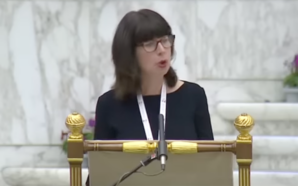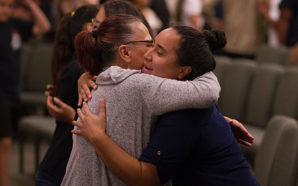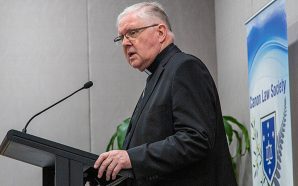Homily for the Thirty-Second Sunday in Ordinary Time
Readings: Wisdom 6:12-16; Psalm 62(63): 2-8; 1 Thessalonians 4:13-18; Matthew 25:1-13
8 November 2020
In today’s Gospel from Matthew, Jesus tells another parable about the kingdom of heaven. This time the kingdom is compared with a wedding feast when the bridegroom is delayed, presumably negotiating last-minute financial arrangements with the father of the bride as was the custom in those days and in those communities. The scripture scholar Daniel Harrington tells us: “Since negotiations about the terms of the marriage contract could get involved, perhaps the groom’s delay should not be considered unusual. At any rate, his return after dark is assumed since all the maidens took lamps along with them. At his return with his bride, the wedding feast could begin at his own household. So there is nothing out of the ordinary in the story with respect to first-century Jewish wedding customs.”[1]
LISTEN: https://soundcloud.com/frank-brennan-6/homily-81120
When Jesus told the parable originally, the listeners would have presumed that the bridegroom was Yahweh betrothed to Israel. When the Matthean community repeated the parable, time and again, the listeners would have increasingly identified Jesus as the bridegroom urging the believing community to stay awake because they did not know either the day or the hour.
As contemporary listeners to the parable with its allegorical overtones for the Church, we, while waiting for all manner of things to happen, face a simple choice. We can be like the five bridesmaids who wing it, bringing only our lamps and forgetting or overlooking the need for backup resources, the oil without which the lamps cannot be re-lit at midnight. Though Fr Harrington assures us that a delay was not unusual for a wedding feast, a delay until midnight does seem somewhat out of the ordinary. At least some of those five would have considered what was the more usual delay, thinking there was no need to make provision for a midnight lighting of the lamps. They might not all have been negligent or unthinking about all reasonable future possibilities.
Or we can be like the five bridesmaids who while waiting, cover all conceivable possibilities including the very belated arrival of the bridegroom at midnight. Whether the narrator is Jesus himself or later members of the Matthean community, the narrator is wanting the listener to respond: Of course, I would want to be one of the sensible ones; I would not want to be one of the foolish ones.
We’ve all been doing quite a deal of waiting of late – whether it be for the lifting of lockdown restrictions at a time of pandemic, or for the outcome of this week’s US presidential election. And all the time, we believers are waiting for the coming of the Kingdom with signs of its breaking in here and now. What does it mean to be a sensible person in waiting? What are the signs of a foolish community in waiting?
The night after President Obama’s election 12 years ago, I happened to be in the Mall in Washington DC. I joined a throng of people who were waiting for this new president with great expectation. Activists had erected a wooden, prefabricated wall between the Reflecting Pool and the Lincoln Memorial. The wall carried a banner headline that echoed the refrain from Obama’s Grant Park Chicago declaration the previous night: ‘Yes we can’. The wall had been up for a few hours only. Thousands of people had already signed it, attaching photos and messages. The central message on the wall read:
As citizens across the world, we congratulate you on your election, and celebrate your campaign commitments to sign a strong new global treaty on climate change, close Guantanamo prison and end torture, withdraw carefully from Iraq, and double aid to fight poverty. No one country or leader can meet the world’s most pressing challenges alone, but working together as one world in a spirit of dialogue and cooperation, yes we can bring real and lasting change.
12 years on, we would have to admit that some of these key hopes were never realised or were later dashed. Were we wise or foolish to entertain such hopes, to proclaim ‘Yes we can’?
While awaiting this year’s US presidential election result, I attended yet another Zoom conference, this one hosted by Magdalene College Cambridge. The main speaker was Rowan Williams, one-time Archbishop of Canterbury, addressing the topic ‘Overcoming Political Tribalism’. We were welcomed by the Master of the College, Sir Christopher Greenwood, a charming and excessively polite Englishman. He looked familiar.
Back in March 2014, Sir Christopher had been a judge of the International Court of Justice ruling against Australia which had seized legal papers belonging to Timor Leste and its lawyers. In his judgment, Sir Christopher had offered this damning indictment of Australia’s behaviour: “In view of the seizure of papers which clearly related to legal advice and preparation for the forthcoming arbitration from Timor-Leste’s lawyer, it is entirely understandable that Timor-Leste is concerned that there might be future interference and it sought an assurance from Australia that there would be no such interference. To my surprise, the undertaking from the [Australian] Attorney-General makes no mention of this matter. In the absence of any undertaking not to interfere with Timor-Leste’s communications with its lawyers in the future, I accept that there is a real and imminent risk of such interference which requires action on the part of the Court.”[2]
The other night Sir Christopher told his largely Australian audience that lawyers can tend to be too narrow in their thinking, confining considerations of justice to procedural due process. Rowan Williams told us: “There is in humanity something to which justice must be done.” In his paper for the conference, Williams wrote: “It is essential for an intelligent, compassionate, and sustainable political democracy to focus more on manageable solutions to specific unjust situations rather than being paralysed by maximalist general demands.”[3]
No matter how objectionable many of us may find the antics of President Trump, we need to acknowledge that more Americans turned out to vote for him than for any other candidate in history, other than his opponent Joe Biden who has outpolled him by more than four million votes. Despite Trump’s mishandling of the COVID pandemic resulting in 236,000 deaths, more than 70 million Americans who are not compelled to vote turned out to vote for him. Americans live in a very polarised society. We all live in a very polarised world.
Waiting for the bridegroom to arrive we know not when, and perhaps even as late as midnight, we have to ask what is it to wait and prepare sensibly for engagement in such a polarised world. Rowan Williams has identified the problem with those foolish bridesmaids who engage in what he calls political tribalism which shrinks the scope for mutual recognition in a polarised situation. The foolish bridesmaid is the one who says, “I resolve not to think of the other’s view as sharing any of the moral anxieties or emotional tensions I experience.” He warns against that political tribalism that “inexorably moves towards de-legitimising the other in debate” and which “is a fertile seedbed for totalitarianism.” The wise bridesmaid is the one who is looking for a shared language in uncertain times of waiting and conflict.
With his finest English equilibrium, Williams says “this is not a bland appeal for civility in political debate” but rather an investment of the stranger. Williams is not wanting to “relativise or weaken commitments or to accept an indefinite standoff.” Rather he is trying “to discover what the ‘grammar’ of another’s moral energy has in common with my own, as the condition for intelligent action.” Most of those who voted for President Trump do not engage in his objectionable antics, nor do they approve of them. Despite Trump’s antics and despite 10 million COVID cases, they think he acts ultimately in their interests, many of them feeling disempowered by the elites. The wise bridesmaid needs to be able to understand and engage with persons who think their interests are better protected by a Trump rather than by a Biden. This is not just about politics, and it’s not just about reducing ourselves to being citizens. We are also religious people. We are Christians. We are Catholics. While we wait, we have a mission from God. Williams reminded us this week that “the truly emancipated citizen is someone who is not just a citizen. Civic virtue is bound up with affiliations and convictions that have more than just civic roots and sanctions.”
While we await a concession speech by Mr Trump, whether grudging or gracious, let’s refill our lamps seeking to “salvage an intelligent, compassionate, and pluralist democracy from the wreckage of so much political habit.” Let’s be sensible believers in waiting. Let’s maintain the hope that wisdom is near at hand. Let’s pray for wisdom in the hearts and minds both of Trump supporters and Biden supporters and also in the hearts and minds of the rest of us who look on, aware that the choice of an American president affects more than the affairs of those entitled to vote in the 50 states of the union.
Resplendent and unfading is wisdom,
and she is readily perceived by those who love her,
and found by those who seek her.
She hastens to make herself known in anticipation of their desire;
Watch for her early and you will have no trouble;
you will find her sitting at your gates. (Wisdom 6:12-14)
And if any of you sensible people in waiting have some spare oil, it would be not only generous but also prudent to share it with those whose lamps are flickering in the darkness of our polarised world.
Fr Frank Brennan SJ is the Rector of Newman College, Melbourne, the Distinguished Fellow of the P M Glynn Institute, Australian Catholic University, and the former CEO of Catholic Social Services Australia (CSSA).
[1] Harrington, D. J., The Gospel of Matthew, Collegeville, MN: Liturgical Press, 2007, p. 349
[2] Questions relating to the Seizure and Detention of Certain Documents and Data (Timor‐Leste v. Australia), Provisional Measures, Order of 3 March 2014, I.C.J. Reports 2014, p. 147 at p. 207
[3] Rowan Williams, Overcoming Political Tribalism, P M Glynn Lecture 2019, Australian Catholic University at https://www.acu.edu.au/-/media/feature/pagecontent/richtext/about-acu/institutes-academies-and-centres/pm-glynn/_docs/overcoming-political-tribalism-lecture-booklet-web-version.pdf?la=en&hash=9C120650FD7E98CD2E14FD2D7790D78D








